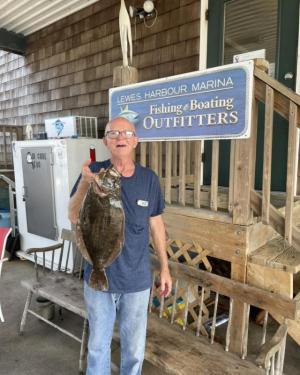The Delaware Department of Natural Resources and Environmental Control will host free introductory fly-fishing lessons Saturday, Sept. 24, and Saturday, Oct. 1 from 9 a.m. until noon at the Aquatic Resources Education Center, 2520 Lighthouse Road, Smyrna. The DNREC Division of Fish and Wildlife and the White Clay Fly Fishers Club will provide instruction. Participants are encouraged to bring their own fly-fishing equipment, but there will be equipment available for those who do not have their own.
Licensed anglers 16 and older must register at de.gov/arec. Exempt anglers must have their FIN number.
All of this sounds very innocent, but I must warn you, fly fishing is addictive. It’s just like my first cigarette from my older cousin behind the barn on his father’s farm. I was 12 years old. By the time I finally quit, I was 24.
First, you begin by catching sunfish in the local pond or creek. They are easy and will hit just about anything. Next, it’s trout on opening day in a downstate pond or New Castle County creek. Then the fly-fishing-only part of White Clay Creek where you meet many more of the tribe. Soon they will have you talking about Wooly Buggers, Hoppers, Royal Coachmen and the ever-popular Green Weenie.
Finally, you will begin to look with disfavor upon those of us who resort to worms, corn, flashy spinners and Gulp! twister tails to catch our trout. Barbarians, you will call us.
But the worst is yet to come – when the first Orvis catalog arrives and your eyes glaze over and your credit card screams in agony. It starts with the vest. The vest has hundreds of pockets, and you must fill every one. There are also dangling little things from which you must hang stuff. That stuff costs money. The fact that a $2 pair of nail clippers would do the same job as a $50 pair of line snips is not even considered.
Fly-tying materials come next. Having watched the Delaware Saltwater Fly-Fishers tie flies on Saturday mornings at Lewes Harbour Marina, apparently you can’t have too much material. I will say these ladies and gentlemen will share whatever they have with one another.
I almost hate to mention fly lines, leaders, rods and reels. I do admit I have a few rods and reels for fishing light tackle, surf, inlet, deepwater bottomfish and, at one time, offshore fishing. Pretty much the same thing happens with fly-fishing. They have different rod lengths and weights for different types of fishing. Same with fly lines. Different tapers, weights and floating or sinking. Leaders come in all sorts of lengths and breaking strengths.
And a final warning, fly fishers actually fish! This will come as a shock to us surf fishermen who cast out, put the rod in a sand spike and then sit down, enjoy a cold beverage and wait for a fish to bite. Fly fishing requires constant casting and retrieving.
Trolling is also somewhat of a passive sport. You set the lines, then watch them until a fish hits the lures. When fly fishing from a boat, you do troll until a fish comes into the spread and the captain takes the boat out of gear. The angler casts to the fish from a dead boat.
So, before you sign up for the fly-fishing course, remember it could be a life-changing event.
Survey boats
There have been quite a number of comments on social media about the survey boats operating in the ocean close to 3R’s Beach. I had no idea we had that many engineers and fishery experts out there, and their intelligent comments are really appreciated. I certainly hope the next time there is a public forum they will share their knowledge in that format. I was the only fisherman at the last forum and it sure was lonely.
The boats are testing the bottom off the beach looking for the best location to bring the power cables ashore from the windmills that will be built in the ocean. Once they finish in the ocean, they will move to Indian River Bay and do the same job there.
I know there are many people who believe they can stop the windmills, but I don’t think so. What we just might be able to do is work with the engineers to get the best possible outcome for fishing that we can. We can try to get the cables buried as deep as possible. Get the water around the windmills open for fishing. Renewable energy is the future. Fossil fuel is as dead as the dinosaurs that make it up.






















































